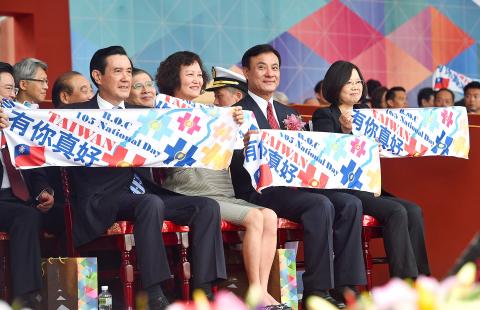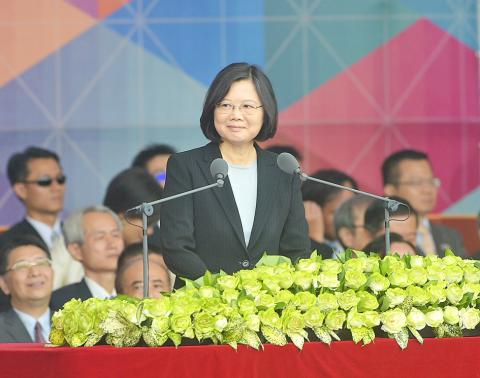President Tsai Ing-wen (蔡英文), in her first Double Ten National Day speech, yesterday urged Beijing to face up to the existence of the Republic of China (ROC) and sit down with Taipei for dialogue, while reiterating what some have termed her “new four noes” for cross-strait relations.
“I call upon the authorities of mainland China to face up to the reality that the ROC exists and that the people of Taiwan have an unshakable faith in the democratic system. The two sides of the Taiwan Strait should sit down and talk as soon as possible,” Tsai said from a podium in front of the Presidential Office Building in Taipei at a ceremony marking the ROC’s 105th birthday.
Despite ups and downs in cross-strait relations in the past months, Tsai said her administration’s position remains the same: No changes in its pledges, no changes in its goodwill, no bowing to pressure and no reversion to the old path of confrontation.

Photo: Peter Lo, Taipei Times
While some political analysts anticipated a certain degree of compromise on the so-called “1992 consensus” in the wake of Beijing’s increased pressure since Tsai took office in May, she did not depart from her previous comments on the issue.
“We respect the historical fact that in 1992, a meeting occurred between the two institutions representing each side across the Taiwan Strait, Taiwan’s Straits Exchange Foundation and China’s Association for Relations Across the Taiwan Straits,” she said.
The two sides should cherish the achievements accumulated through decades of interactions and negotiations since 1992, while promoting stable and peaceful cross-strait relations based on existing political foundations, she said.

Photo: Chang Chia-ming, Taipei Times
Tsai also reiterated the promises she made in her May 20 inaugural address to maintain the “status quo” and conduct cross-strait affairs in accordance with the ROC Constitution, the Act Governing Relations Between the People of the Taiwan Area and the Mainland Area (兩岸人民關係條例), and other laws.
“I also call on the two governing parties across the Taiwan Strait to set aside the baggage of history and engage in positive dialogue for the welfare of people on both sides,” the president said.
Anything conducive to cross-strait peace and the public’s welfare could be included, she said.
The “1992 consensus” refers to a tacit understanding between the Chinese Nationalist Party (KMT) and Beijing that both sides of the Strait acknowledge there is “one China,” with each side having its own interpretation of what “China” means. Former Mainland Affairs Council chairman Su Chi (蘇起) said in 2006 that he had made up the term in 2000.
Turning to domestic issues, Tsai said that her belief that “changing the predicament facing young people is changing a nation’s predicament” has been in the center of each reform her administration has initiated.
The government is endeavoring to expand social housing by 80,000 units over the next four years, build a long-term care system, promote a daycare program, reform the pension systems, revitalize the economy and industry, and push for transitional justice to give young people a healthy and diverse democracy, she said.
“Dear fellow citizens: A road of reform is certain to have its ups and downs. However, I call earnestly on all of you, do not let the ups and downs make you lose hope in Taiwan,” she said.
Tsai said she intends to seek mutually beneficial cooperation with allies rather than one-way giving while proactively and steadfastly seeking a space on the world stage.
As for the nation’s economic dependence on China, Tsai said she aims to redefine Taiwan’s role in the Asia-Pacific region, identify a new driving force for growth and promote her “new southbound policy.”
Tsai’s speech was not the only focus of public attention during yesterday’s ceremony. The interaction of politicians and behavior of other high-profile guests among the 11,000 attendees, including more than 360 foreign guests, was closely watched.
Former president Ma Ying-jeou (馬英九) neither shook hands nor spoke with Tsai, who was separated from him on the grandstand by Legislative Speaker Su Jia-chyuan (蘇嘉全), the chairman of the National Day celebrations, and his wife, Hung Heng-chu (洪恆珠); the pair simply nodded to one another as Tsai returned to her seat after her 18-minute speech.
Former presidential adviser Koo Kwang-ming (辜寬敏), a long-time pro-independence activist, was conspicuous at the beginning of the ceremony when he was the only person to remain seated as everyone else on the grandstand stood and bowed to a portrait of ROC founding father Sun Yat-sen (孫逸仙) that hung at the back of the main stage.
KMT Legislator Wang Jin-pyng (王金平), the former legislative speaker, was among the KMT legislative caucus members not to boycott the ceremony. Speaking to reporters on the sidelines, Wang said that having organized more than 15 National Day celebrations when he was legislative speaker, each year he always hoped that all the invited guests would attend the ceremonies.
“Since I was invited this year, there is no reason I should not come,” Wang said.

Tropical Storm Gaemi strengthened into a typhoon at 2pm yesterday, and could make landfall in Yilan County tomorrow, the Central Weather Administration (CWA) said yesterday. The agency was scheduled to issue a sea warning at 11:30pm yesterday, and could issue a land warning later today. Gaemi was moving north-northwest at 4kph, carrying maximum sustained winds near its center of up to 118.8kph and gusts of 154.8kph. The circumference is forecast to reach eastern Taiwan tomorrow morning, with the center making landfall in Yilan County later that night before departing from the north coast, CWA weather forecaster Kuan Shin-ping (官欣平) said yesterday. Uncertainty remains and

SEA WARNING LIKELY: The storm, named Gaemi, could become a moderate typhoon on Wednesday or Thursday, with the Taipei City Government preparing for flooding A tropical depression east of the Philippines developed into a tropical storm named Gaemi at 2pm yesterday, and was moving toward eastern Taiwan, the Central Weather Administration (CWA) said. Gaemi could begin to affect Taiwan proper on Tuesday, lasting until Friday, and could develop into a moderate typhoon on Wednesday or Thursday, it said. A sea warning for Gaemi could be issued as early as Tuesday morning, it added. Gaemi, the third tropical storm in the Pacific Ocean this typhoon season, is projected to begin moving northwest today, and be closest to Taiwan on Wednesday or Thursday, the agency said. Today, there would likely

DISRUPTIONS: The high-speed rail is to operate as normal, while several airlines either canceled flights or announced early departures or late arrivals Schools and offices in 15 cities and counties are to be closed today due to Typhoon Gaemi, local governments announced last night. The 15 are: Taipei, New Taipei City, Taoyuan, Tainan, Keelung, Hsinchu and Kaohsiung, as well as Yilan, Hualien, Hsinchu, Miaoli, Chiayi, Pingtung, Penghu and Lienchiang counties. People should brace for torrential rainfall brought by the storm, with its center forecast to make landfall on the east coast between tonight and tomorrow morning, the Central Weather Administration (CWA) said. The agency issued a sea warning for the typhoon at 11:30pm on Monday, followed by a land warning at 11:30am yesterday. As of

CASUALTY: A 70-year-old woman was killed by a falling tree in Kaohsiung as the premier warned all government agencies to remain on high alert for the next 24 hours Schools and offices nationwide are to be closed for a second day today as Typhoon Gaemi crosses over the nation, bringing torrential rain and whipping winds. Gaemi was forecast to make landfall late last night. From Tuesday night, its outer band brought substantial rainfall and strong winds to the nation. As of 6:15pm last night, the typhoon’s center was 20km southeast of Hualien County, Central Weather Administration (CWA) data showed. It was moving at 19kph and had a radius of 250km. As of 3pm yesterday, one woman had died, while 58 people were injured, the Central Emergency Operation Center said. The 70-year-old